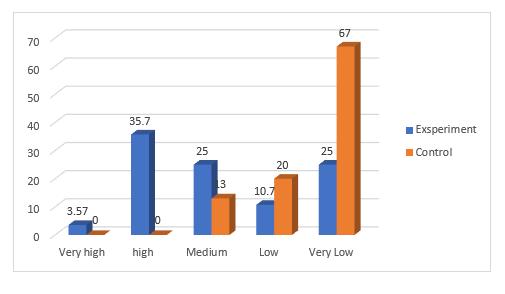The Influence of Student Worksheets Based on PBL-Mathematical Literacy on Problem-solving in Junior High Schools in Bengkulu
Main Article Content
Abstract
Purpose – Problem-solving is a key component in mathematics education, as emphasized by the NCTM. At SMAN 6 Kota Bengkulu, students’ performance in trigonometry remains low due to weak problem-solving skills and limited engagement. This study investigates the effect of the Problem-Based Learning (PBL) model, supported by mathematical literacy worksheets, on students’ mathematical problem-solving abilities.
Methodology – A quasi-experimental design was employed using the Nonequivalent Posttest-Only Control Group Design. The population consisted of all 10th-grade students at SMAN 6 Bengkulu. Two classes were selected: Class XJ as the experimental group, taught using the PBL model with literacy-based worksheets, and Class XI as the control group, taught using a Cooperative Learning model. Data were collected through a mathematical problem-solving test and analyzed using an independent t-test.
Findings – Results showed a significant difference in performance, with t<sub>value</sub> = 3.713 > t<sub>critical</sub> = 1.673, indicating that the experimental group outperformed the control group in problem-solving ability.
Novelty – This study offers a novel integration of PBL with mathematical literacy worksheets—an underexplored instructional approach in secondary trigonometry education. By combining content-specific literacy materials with a problem-based pedagogy, the study addresses a gap in research focused on enhancing higher-order thinking in mathematics.
Significance – The findings provide empirical support for incorporating literacy-based, student-centered strategies in mathematics instruction. The study has implications for curriculum design aimed at improving problem-solving performance in similar educational contexts.
Article Details
References
Ahmad, M., & Asmaidah, S. (2018). Pengembangan Perangkat Pembelajaran Matematika Realistik Untuk Membelajarkan Kemampuan Pemecahan Masalah Matematika Siswa Smp. Mosharafa: Jurnal Pendidikan Matematika, 6(3), 373–384. https://doi.org/10.31980/mosharafa.v6i3.326
Aprilia, A., & Fitriana, D. N. (2022). Mindset Awal Siswa Terhadap Pembelajaran Matematika Yang Sulit dan Menakutkan. 1(2), 28–39.
Arends, R. I. (2012). Learning to Teach Ninth Edition (9th ed.). McGraw-Hill Companies, Inc.
Baidawi, A. M., Fitriyah, L. M., & Minggani, F. (2023). Hubungan Kecerdasan Logis dan Literasi Matematis Terhadap Hasil Belajar Matematika Siswa SMPN 2 Arjasa. Jurnal Inovasi Pembelajaran Matematika (JIPM), 4(2), 97–104. https://doi.org/10.36379/jipm.v4i2.391
Haety, N. I., & Putra, B. Y. G. (2022). Analisis Kemampuan Pemecahan Masalah Matematis pada Materi Statistika: Implementasi Model Problem-Based Learning. Symmetry: Pasundan Journal of Research in Mathematics Learning and Education, 7(2), 97–116. https://doi.org/10.23969/symmetry.v7i2.6713
Nisak, K., & Istiana, A. (2017). Pengaruh Pembelajaran PBL (Problem Based Learning) terhadap Kemampuan Pemecahan Masalah Matematis Siswa. JKPM (Jurnal Kajian Pendidikan Matematika), 3(1), 91. https://doi.org/10.30998/jkpm.v3i1.2540
OECD. (2019). PISA 2018 Assessment and Analytical Framework. In OECD Publishing.
Oktania, D., & Djami, C. B. N. (2022). Efektivitas Penggunaan Model Problem Based Learning Berbantuan Grocery Shopping dalam Meningkatkan Kemampuan Pemecahan Masalah Matematika Siswa pada Materi Pecahan. Proximal: Jurnal Penelitian Matematika Dan Pendidikan Matematika, 5(2), 40–49. https://doi.org/10.30605/proximal.v5i2.1832
Poernomo, E., Kurniawati, L., & Atiqoh, K. S. N. (2021). Studi Literasi Matematis. ALGORITMA: Journal of Mathematics Education, 3(1), 83–100. https://doi.org/10.15408/ajme.v3i1.20479
Poon, S. K., Centre, I., Hong, T., Polytechnic, K., Learning, C. P., & Education, D. (1997). PROBLEM-BASED LEARNING IN DISTANCE EDUCATION Reference Citation : Problem-Based Learning in Distance Education. Proceedings of the 5th International Conference on Modern Industrial Training, 593–600.
Prastowo, A. (2015). Panduan Kreatif Membuat Bahan Ajar Inovatif. Diva Press.
Rahmawati, D., Khoirunnisa, A., & Isyah Sekarsari, A. ’. (2023). Analisis Penerapan Model Pembelajaran Problem Based Learning dalam Pembelajaran Matematika Terhadap Keterampilan 4C. Prosiding Seminar Nasional Pendidikan Matematika IV (Sandika IV, 4(1), 489–498.
Sugiyono. (2019). Metode Penelitian Kuantitatif Kualitatif dan R&D (Sutopo (ed.); 2nd ed.). Alfabeta.
Susanta, A., Sumardi, H., Susanto, E., & Retnawati, H. (2023). Mathematics literacy task on number pattern using Bengkulu context for junior high school students. Journal on Mathematics Education, 14(1), 85–102. https://doi.org/10.22342/JME.V14I1.PP85-102
Ulva, E., Maimunah, M., & Murni, A. (2020). Pengaruh Model Problem Based Learning Terhadap Kemampuan Pemecahan Masalah Matematis Siswa Kelas VII SMPN Se-Kabupaten Kuantan Singingi Pada Materi Aritmetika Sosial. Jurnal Cendekia : Jurnal Pendidikan Matematika, 4(2), 1230–1238. https://doi.org/10.31004/cendekia.v4i2.356
Yusri, A. Y. (2018). Pengaruh Model Pembelajaran Problem Based Learning Terhadap Kemampuan Pemecahan Masalah Matematika Siswa Kelas Vii Di Smp Negeri Pangkajene. Mosharafa: Jurnal Pendidikan Matematika, 7(1), 51–62. https://doi.org/10.31980/mosharafa.v7i1.341
